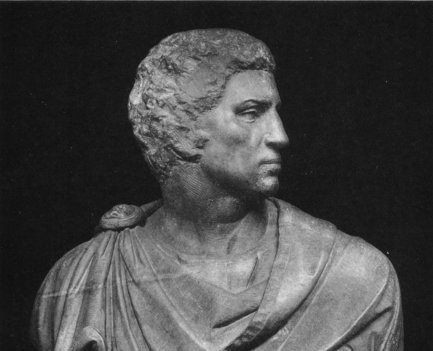Most people know the story of the assassination of Julius Caesar on the 15 March 44 B.C.E. Shakespeare made the event famous in his play Julius Caesar, and has left many saying “Beware the ides of March.”1 However, the assassination of Caesar may never have happened if Marcus Brutus had not agreed with Cassius. To understand the complete story of the assassination of Caesar, one has to understand the role that Marcus Brutus played.
Marcus Junius Brutus the Younger, better known as Brutus, is descended from Lucius Junius Brutus, founder and first consul of the Roman Republic in 509 B.C.E. The political future of Rome was so important to Lucius that he ordered his oldest two sons put to death for their desire to restore Rome to a monarchy. Lucius spared the life of his youngest son and it is through him that Marcus was born.2 Brutus’ own father, Marcus Brutus, was killed by Pompey the Great during a revolt.3
So who was this Brutus? He was a typical Roman, who received the traditional education of the Roman elite and was greatly influenced by the writings of Plato. Upon completion of his education, Brutus was given a position in the government.4 In both his marriage and in his public life, Brutus was expected to align with Caesar, but instead, he made his peace with Pompey the Great, eventually siding with him during the Roman Civil War in 49-48 B.C.E.5
Brutus was captured at the Battle of Pharsalus and spared by Caesar, causing Brutus to switch sides to Caesar.6 It is important to note at this time that Caesar had a special fondness for Brutus, believing Brutus was his son, born out of a love affair Caesar had with Servilia, Brutus’ mother. Out of this fondness, Caesar had instructed his commanders not to harm Brutus should he be captured in battle.7 Caesar pardoned Brutus for his role during the Civil War and gave him a high ranking government job. Brutus in turn convinced Caesar to give a government position to Cassius, Brutus’ brother-in-law.8
It was during this time following the Civil War that Caesar declared himself dictator of Rome, as allowed by the constitution during times of emergency, but not to last more than six months. Caesar wore the robe, crown, and scepter of the general, and called himself imperator. As leader of Rome, he had complete control over the armies. Many senators felt their power being threatened and feared that Caesar would soon appoint himself King of Rome.9
Cassius did not like Caesar, and soon began to plot to end his reign of power. He attempted to recruit his friends and fellow senators, but they refused to go along with Cassius unless he could convince Brutus to join them.10 Brutus had such an honorable reputation that his participation was crucial to the success of the cause. Brutus agreed to participate because of his family history in creating and protecting the Republic at its founding and the ensuing Roman tradition of opposing all forms of tyranny. Both Brutus and Cassius believed that once Caesar was dead, Rome would naturally return to the traditional Republic.11
The group of conspirators had heard that Caesar would be attending a senate meeting on March 15, and they planned the assassination for that day. They knew that it would not look suspicious, since they all had to attend the meeting of the senate and they believed that the Ides of March was a blessed day to make their move, since it was a religious holiday in Rome. Ironically, there was a statue of Pompey the Great, the leader Caesar had killed after the Civil War ended, in the portico where the assassination was to take place as soon as Caesar arrived. The conspirators believed it to be the perfect date and place to make their attempt to restore the Republic.12

However, on the planned day, Caesar was late and the conspirators became worried. When Caesar finally arrived, the senators surrounded him as he took his seat, and the attack began. All the senators attacked at once, creating a frenzy in which many of the them were stabbed in the process; even Brutus was stabbed in the hand. When that attack was over, Caesar was dead.13 The next day, Antonius (also known as Mark Antony), the sole remaining consul, granted all the conspirators amnesty, and distributed provinces to them as rewards. Brutus was given the province of Crete and moved there with his family where he continued to work for the government.14

Meanwhile, Octavian, Caesar’s nephew and heir, was brought to the capital to take Caesar’s place as leader of Rome. Octavian was angry that Antonius had pardoned the conspirators and when the common people of Rome learned of the assassination of Caesar, they too were angry that none of the conspirators had been punished. This rift between the people and the leaders began to cause a rift between Octavian and Antonius. Soon the leaders of Rome began to align themselves between Octavian and Antonius, and another war civil war began. Known as the Post-Caesarian Civil War, this war was between Octavian and his supporters and Antonius and his supporters in order to end the rift that had been growing. It did not take long for Antonius to be defeated by Octavian, resulting in a truce that joined their armies together. This is also when the Second Triumvirate was formed in 43 B.C.E. between Octavian, Antonius, and Marcus Lepidus allowing the three of them to rule Rome together.15
The next civil war in Rome, known as the Liberators’ Civil War, was fought between the Second Triumvirate and the liberators (those who assassinated Caesar and their supporters). Brutus and Cassius were the main targets of the Roman army and separately rallied troops to fight with them. Brutus, according to Plutarch, “was esteemed by the many for his virtues, but loved by his friends, admired by the nobles, and not hated even by his enemies.”16 Because of this, many people in Rome had faith in his motives and believed that while the other senators had murdered Caesar out of hatred and spite for his power, Brutus had participated because he truly wanted to end the tyranny that he believed Caesar had created in Roman government.17 Unable to defeat Octavian’s army, Cassius, fearing being captured, committed suicide.18
Unfortunately for Brutus, his army was not able to defeat the Roman army either, and he admitted defeat at the Battle of Philippi in 42 B.C.E. Also fearing being captured, Brutus fled to the hills with a good friend and fellow soldier. It was there that Brutus convinced his friend to take his sword and hold it upright, Brutus then fell upon his sword, killing himself. Antonius still held much respect for Brutus and had his body wrapped up in the finest purple cloth for the cremation. After he was cremated, his ashes were sent to his mother, since his wife was already dead, another suicide.19
Even after his death, Brutus served as a role model for senators and his story reminded emperors that they served at their own peril if they ignored the senate.20 Brutus did not end tyranny or civil war, with many battles leading to the loss of the Roman Republic. According to Shakespeare, Brutus acted out of honor to protect his home from a tyrant. Dante placed Brutus in the worst level of Hell in the mouth of Satan next to Judas Iscariot.21 Either way one remembers Brutus, one must remember the conspiracy would never have gotten anywhere without the participation of Brutus.
- William Shakespeare, Julius Caesar (Boston: Ginn and Company, 1908), Kindle edition, Act 1 scene 2. ↵
- Salem Press Biographical Encyclopedia, January 2017, s.v. “Marcus Junius Brutus,” by Michael Witsoki. ↵
- Salem Press Encyclopedia, January 2016, s.v. “Brutus,” by Richard Westall. ↵
- Salem Press Biographical Encyclopedia, January 2017, s.v. “Marcus Junius Brutus,” by Michael Witsoki. ↵
- Salem Press Encyclopedia, January 2016, s.v. “Brutus,” by Richard Westall. ↵
- Salem Press Encyclopedia, January 2016, s.v. “Brutus,” by Richard Westall. ↵
- Plutarch, Plutarch’s Lives Volume IV (London: George Bell & Sons, 1892), 402, Project Gutenberg, https://www.gutenberg.org/files/44315/44315-h/44315-h.htm#Page_398 (accessed October 23, 2017). ↵
- Plutarch, Plutarch’s Lives Volume IV (London: George Bell & Sons, 1892), 404-405, Project Gutenberg, https://www.gutenberg.org/files/44315/44315-h/44315-h.htm#Page_398 (accessed October 23, 2017). ↵
- Funk & Wagnalls New World Encyclopedia, 2016, s.v. “Caesar, Gaius Julius.” ↵
- Plutarch, Plutarch’s Lives Volume IV (London: George Bell & Sons, 1892), 407-408, Project Gutenberg, https://www.gutenberg.org/files/44315/44315-h/44315-h.htm#Page_398 (accessed October 23, 2017). ↵
- Salem Press Biographical Encyclopedia, January 2017, s.v. “Marcus Junius Brutus,” by Michael Witsoki ↵
- Plutarch, Plutarch’s Lives Volume IV (London: George Bell & Sons, 1892), 410-412, Project Gutenberg, https://www.gutenberg.org/files/44315/44315-h/44315-h.htm#Page_398 (accessed October 23, 2017). ↵
- Plutarch, Plutarch’s Lives Volume IV (London: George Bell & Sons, 1892), 413, Project Gutenberg, https://www.gutenberg.org/files/44315/44315-h/44315-h.htm#Page_398 (accessed October 23, 2017). ↵
- Plutarch, Plutarch’s Lives Volume IV (London: George Bell & Sons, 1892), 416, Project Gutenberg, https://www.gutenberg.org/files/44315/44315-h/44315-h.htm#Page_398 (accessed October 23, 2017). ↵
- Plutarch, Plutarch’s Lives Volume IV (London: George Bell & Sons, 1892), 418-419, Project Gutenberg, https://www.gutenberg.org/files/44315/44315-h/44315-h.htm#Page_398 (accessed October 23, 2017). ↵
- Plutarch, Plutarch’s Lives Volume IV (London: George Bell & Sons, 1892), 425, Project Gutenberg, https://www.gutenberg.org/files/44315/44315-h/44315-h.htm#Page_398 (accessed October 23, 2017). ↵
- Plutarch, Plutarch’s Lives Volume IV (London: George Bell & Sons, 1892), 425, Project Gutenberg, https://www.gutenberg.org/files/44315/44315-h/44315-h.htm#Page_398 (accessed October 23, 2017). ↵
- Plutarch, Plutarch’s Lives Volume IV (London: George Bell & Sons, 1892), 443-446, Project Gutenberg, https://www.gutenberg.org/files/44315/44315-h/44315-h.htm#Page_398 (accessed October 23, 2017). ↵
- Plutarch, Plutarch’s Lives Volume IV (London: George Bell & Sons, 1892), 449-453, Project Gutenberg, https://www.gutenberg.org/files/44315/44315-h/44315-h.htm#Page_398 (accessed October 23, 2017). ↵
- Salem Press Encyclopedia, January 2016, s.v. “Brutus,” by Richard Westall. ↵
- Kim Zarins, “‘Et tu, Brute?'” Calliope 17, no. 4 (December 2006): 42-44. ↵



83 comments
Tavion Varela
I commend Brutus for committing to assassinate Caesar in an attempt to restore the Republic. Most people in that position would not want to rock the boat and possibly make an already threatening situation, much worse. Yet, in a way, Brutus was the key person in the whole assassination plot following through in the first place. He had to put a stop to a man who was gaining too much power for his own good.
Janie Cheverie
This article brought to light that because Caesar trusted and forgave Brutus because he believed he was his son but, Brutus felt completely different about their relationship. This helped explain why Brutus and Cassius assassinated Caesar because they wanted to restore the traditional Republic and remove the dictatorship. I was shocked that although Brutus killed himself and others the people around him like Antonius, still cared for and respected him.
Kendall Guajardo
This was a really great article and brought to light the reasons behind the ceasars leniency towards Brutus, including the public. His paternal bond through Brutus is probably what kept him alive so long given how he toyed with his alliances. It is a great tragedy that he went through so much for the sake of being virtuous when in reality he seemed like a pawn on Cassius side. Even with his strong will, he was used because as learned in this article, he was an essential component of the conspirators organized attack. Nevertheless even with all of the institutional changes throughout Rome, Brutus did not end up protecting the Republic by his narrow route of killing Ceasar, he just set himself up to be cornered. I think the greatest lesson was that he was his own greatest weakness because of his decisions that were greatly influenced by his idea of morality.
Marcus Saldana
I still can’t decide if what Brutus did was right or wrong. The only thing I know is I respect him for is never breaking his own morales. It’s funny how these government senate leaders try to go against the nephew of a legendary leader. They just got completely demolished in battle what else was supposed to happen. Lastly, the photo of the assassination Ceasar is Iconic that I’m glad took a big portion of the article. Great article
Sophia Rodriguez
I like this article because of all the twist it had on whether Cesar’s death would be a betrayal or suicide. This excerpt was really interesting because I do not know a lot about Roman history, so reading this was very informative. The part that I found most interesting was when Octavian, Antonius, and Marcus ruled Rome all together and later going to war because no justice to them was sent.
Bailey Godwin
I was shocked that Brutus killed himself at the end of going through so much. This helped explain to me how Brutus planned to assassinate Caesar. I was surprised to see that the people around him loved and cared for him, yet he still felt the need to take his own life as well as other lives. This also explained why Caesar trusted Brutus because he thought Brutus was his own child.
Tyler Caron
The betrayal of Brutus came to a major surprise to Caesar. Caesar felt that Brutus was like his son and was one of his favorite senators. So it was a surprise when he stabbed Caesar in the back, literally. Brutus felt that by murdering his leader that the Republic would become strong once again.
Olivia Tijerina
The message notes the importance about the contribution Brutus had put in vast events. Indeed, this effort to remain what his father, Lucius Junius Brutus, had implemented in his works to have Rome be a Republic. Which the efforts in itself was extensive but it very well rubbed off to his offspring Brutus. Brutus who would live up to the values by betrayal of Caesar who had saved his life and against the Roman Army.
Vania Gonzalez
This article is great Roman history is always an interesting topic for me and I like to learn more about what events led up to other ones. The assignation of Caesar was one that has always been interesting especially since he had no way out or no way of knowing and the suspense that could have built up because of him being late is unimaginable. Great article and topic.
Doan Mai
Born and raised in an Asian country, I am not familiar with ancient Roman history since it is a lot of difference from what I have learned from Asian history. However, the article has helped me understand the assassination of Julius Ceasar by Brutus. It also impressed me that Ceasar believed that Brutus was his son, which was the tremendous mistake of his life.